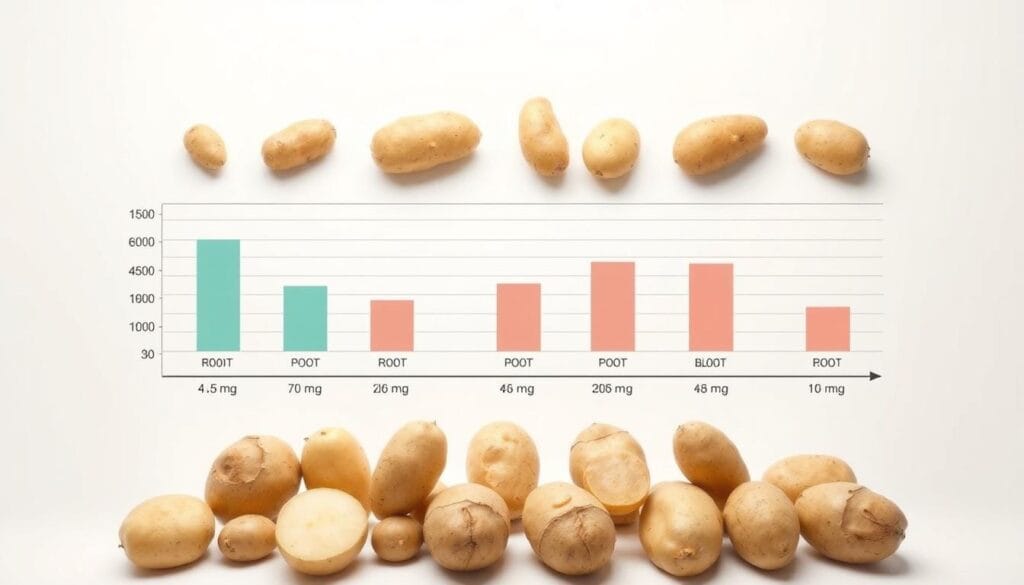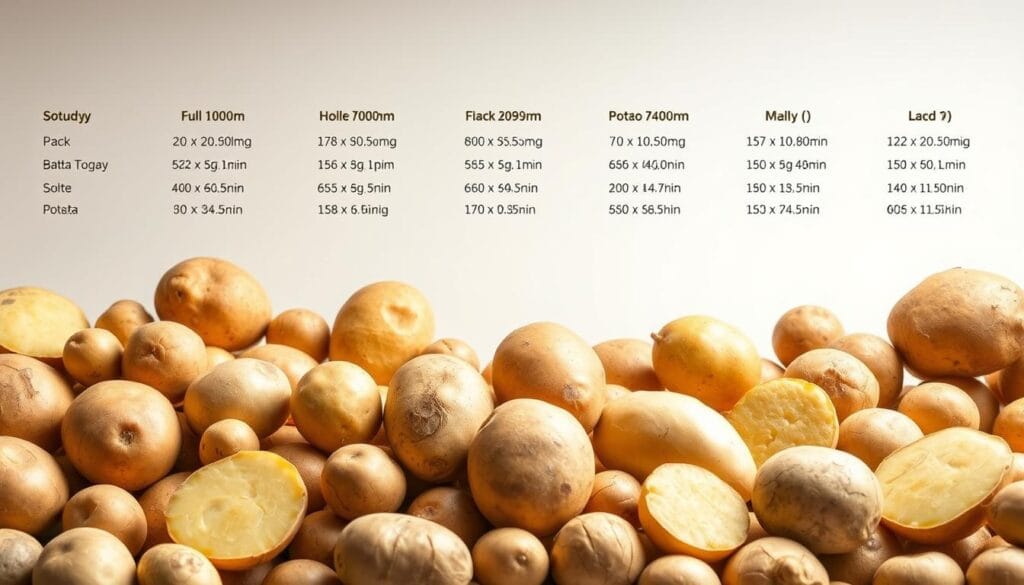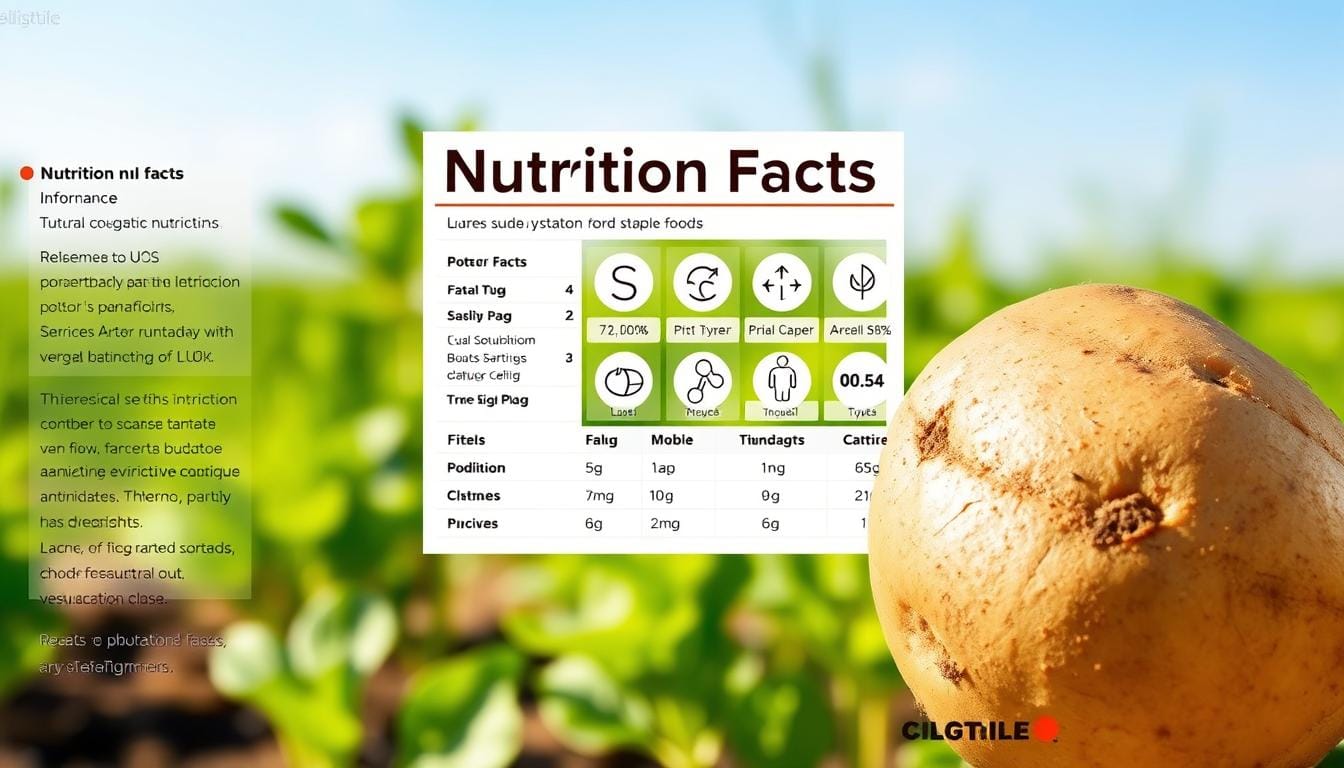Potato Nutrition Information: Facts You Need to Know
Table of Contents
Are you ready to learn the truth about potatoes that diet trends have kept hidden? Potato nutrition information shows a surprising side of this versatile vegetable. It’s more than just simple carbs.
Potatoes have been unfairly blamed in recent years. But, the truth is in their nutrients. A medium russet potato is packed with vitamins, minerals, and a good mix of macronutrients. It supports your health in many ways.
Looking deeper into potato nutrition reveals more than meets the eye. These simple tubers are not just starchy side dishes. They are nutrient-dense foods that can fit into a healthy diet when prepared right.
Key Takeaways
- Potatoes provide essential nutrients with only 164 calories per medium serving
- 88% of potato calories come from nutritious carbohydrates
- One medium potato offers 19% of daily vitamin C requirements
- Potatoes contain more potassium than bananas
- The protein quality in potatoes rivals eggs and other legumes
Understanding Basic Potato Nutrition Information
Potatoes are more than a tasty side dish. They are a nutritional powerhouse. They are packed with essential nutrients. When you look at potato calories and protein, you’ll find they are impressive.
Let’s explore the key nutritional aspects of potatoes. They are a valuable addition to your diet.
Potato Calories and Protein Content
A medium potato has about 164 calories. This makes it a moderate-energy food. Potatoes also have protein, about 4.6 grams per medium-sized potato. This protein helps with your daily intake.
- 100 grams of white potato contains around 125 calories
- Potato protein makes up about 11% of its total calories
- Both white and sweet potatoes offer roughly 2 grams of protein per 100-gram serving
Essential Vitamins and Minerals
Potatoes are nutrient-dense. They offer a range of important vitamins and minerals. They are particularly rich in:
- Vitamin C: 14.4 mg per medium potato (19% daily value)
- Vitamin B6: 0.6 mg per medium potato
- Potassium: More potassium than a banana, supporting muscle and nerve function
Carbohydrate Content and Fiber
Carbohydrates are the primary energy source in potatoes. A medium potato has 37 grams of carbohydrates. This includes 4 grams of dietary fiber. This fiber aids digestion and keeps you full longer.
| Nutrient | Amount per 100g |
|---|---|
| Calories | 125 |
| Protein | 2g |
| Carbohydrates | 21g |
| Fiber | 2.1g |
Understanding potato nutrition helps you make informed dietary choices. These versatile vegetables offer more than great taste. They are a nutritious part of a balanced diet.
Health Benefits of Potatoes
Potatoes are full of nutrients that are good for your health. They are great for a balanced diet because of their many benefits.
Here are some key health benefits of eating potatoes:
- Potassium Powerhouse: One medium potato gives you up to 28% of your daily potassium. This helps keep your blood pressure in check and supports your heart.
- Fiber-Rich Nutrition: Potatoes have 4 grams of fiber per serving. This helps your digestion and keeps your blood sugar stable.
- Low-Calorie Energy Source: With only 164 calories in a medium potato, they give you a nutritious energy boost without adding too many calories.
“Potatoes are not just a side dish, they’re a nutritional ally for your body’s health and wellness.”
Potatoes do more than just provide basic nutrition. Research shows that eating potatoes regularly can improve your health in many ways:
| Nutrient | Amount per Medium Potato | Health Benefit |
|---|---|---|
| Vitamin C | 14.4 mg | Supports immune system |
| Vitamin B6 | 0.6 mg | Promotes brain health |
| Magnesium | 52 mg | Supports muscle and nerve function |
It’s important to cook potatoes the right way to get the most health benefits. Boiling or steaming keeps more nutrients than frying. By choosing healthy cooking methods, you can enjoy the best of what potatoes have to offer for your health.
Glycemic Index and Blood Sugar Impact
Knowing how potatoes affect your blood sugar is key to good eating habits. The nutrition facts of potatoes show how cooking and glycemic index (GI) affect blood glucose.

The glycemic index shows how fast foods raise blood sugar. For potatoes, this can change a lot based on:
- Potato variety
- Cooking method
- Serving size
- Preparation technique
Cooking Methods and GI Scores
How you cook potatoes greatly affects their nutrition and how they raise blood sugar. Here’s a look at GI scores for different potato dishes:
| Potato Type | Glycemic Index | Classification |
|---|---|---|
| Baked Potato | 111 | High |
| Boiled Potato | 82 | High |
| French Fries | 73 | High |
| Carisma Potato | 53 | Low |
Managing Blood Sugar with Potato Consumption
To keep blood sugar stable, try these tips:
- Go for lower GI potato types
- Pair potatoes with protein and fiber
- Watch your portion sizes
- Choose boiling or roasting over baking
Glycemic Load Considerations
Glycemic load gives a fuller picture of potato nutrition. It looks at both GI and total carbs. A big potato (150 grams) with lots of fiber can help control blood sugar.
Keep in mind, everyone reacts differently to potatoes. Talk to a doctor for advice that fits you.
Types of Potatoes and Their Nutritional Profiles
Exploring the world of potatoes shows us many varieties. Each one has special nutrients that can help your diet. From russet to red, white to purple, potatoes are more than just a side dish.

Different types of potatoes offer unique nutritional benefits. Let’s look at the most common varieties and their nutrient profiles:
- Russet Potatoes: High in starch, perfect for baking
- Red Potatoes: Lower in starch, great for roasting
- Yellow Potatoes: Buttery flavor with balanced nutrients
- Purple Potatoes: Rich in antioxidants
Each potato type has its own benefits. Purple potatoes, for example, have extra flavonoids that offer more health protection.
| Potato Type | Carbohydrates | Protein | Fiber |
|---|---|---|---|
| Russet | 20g | 2g | 2.5g |
| Red | 17g | 2g | 2g |
| Purple | 18g | 2g | 3g |
Choosing the right potato can affect the nutrients you get. Think about your cooking method and health goals when picking a variety.
Storage and Preparation Tips for Maximum Nutrition
Learn how to store and prepare potatoes to get the most nutrition. The way you handle potatoes can greatly affect their nutritional value and taste.
Keeping potatoes in the right place is key to keeping their nutrients. The best storage spot is important for keeping potato benefits.
Optimal Storage Conditions
- Store potatoes in a dark, cool pantry or basement
- Maintain temperature between 45-50 degrees Fahrenheit
- Use paper bags or cardboard boxes for storage
- Avoid plastic bags and refrigeration
Healthy Cooking Techniques
Choosing the right cooking method is important for potato benefits. Baking, roasting, and boiling are the best ways to cook potatoes.
| Cooking Method | Calories per Serving | Nutrient Retention |
|---|---|---|
| Baked Potato | 120 | High |
| Roasted Potato | 160 | Medium-High |
| Boiled Potato | 140 | High |
Nutrient Preservation Tips
- Leave potato skins on for maximum fiber and nutrients
- Minimize cooking time to preserve vitamin content
- Avoid green or sprouting potatoes
- Use healthy toppings like herbs and Greek yogurt
Follow these tips for storing and preparing potatoes to get the most nutrition. You’ll enjoy a healthy, tasty food that’s good for your health.
Conclusion
Your journey into potato nutrition shows a complex picture of this versatile food. Potatoes have faced criticism, but they offer many benefits when eaten wisely. Knowing how to prepare and control portions can make potatoes a healthy choice.
Studies show that how you cook potatoes greatly affects their nutrition. Boiling and cooling can lower their glycemic index by almost 40%. This makes them better for managing blood sugar. Adding simple steps like pairing potatoes with broccoli or using vinegar can also help.
Potatoes are also good for the environment. They have a lower carbon and water footprint than many crops. Choosing potatoes can help your health and the planet when prepared healthily.
In the end, it’s about finding balance and making smart choices. Knowing about glycemic impacts, choosing the right cooking methods, and eating potatoes in moderation can be beneficial. This way, you can enjoy their nutrients while aiming for better health and wellness.

